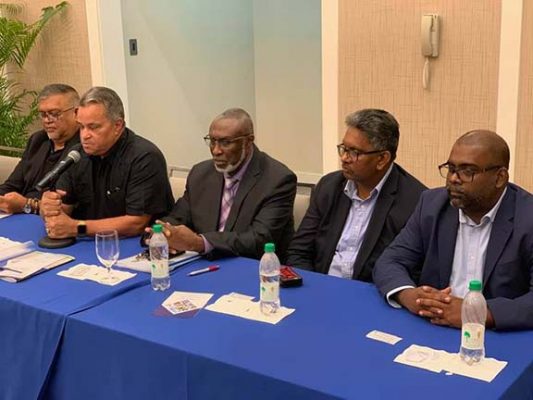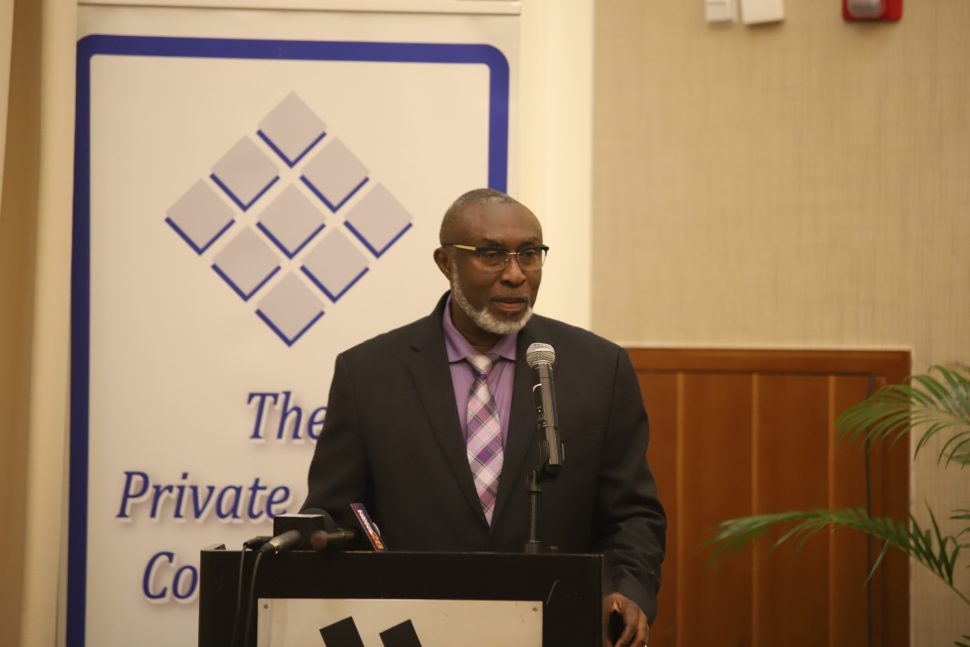The Private Sector Commission (PSC) yesterday urged government and the opposition to find common ground as they both prepare submissions for the Caribbean Court of Justice and it reiterated that business activity here has dropped following the December 21st, 2018 no-confidence motion against government.
“It is of paramount importance that a situation of political instability or crisis be averted at all cost,” outgoing PSC Chairman Desmond Sears told the organisation’s Annual General Meeting.
“These situations dampen investors’ confidence and private investments become slumped or stagnated. And, of course, these are not events that any right thinking Guyanese would want for Guyana at this point in time,” he added.
Sears said that while Guyana can boast of a recent projections that it will be the fastest growing economy in the world next year because of oil revenues, the importance of political stability on a country’s economic growth should simultaneously be underscored.

“…It is the level of confidence in an economy by investors and others alike that is of vital importance to propel any economy towards a path of strong and sustainable growth and prosperity for all,” he said.
He was hopeful that the two sides would find consensus for the sake of the country on a Chairman for the Guyana Elections Commission and general elections date.
“The Private Sector remains cautiously optimistic that the political directorate will come to some compromise. It is a given that everyone agrees that there needs to be fresh elections in which case the people of Guyana and investors alike are therefore hopeful that political stability will be maintained,” Sears said.
With the exception of oil and gas-related dealings, the PSC Chairman noted that that other businesses “are closely monitoring the situation as business activities are noticeably dwindling.”
“I, therefore, wish to take this opportunity to urge our political leaders to resolve these issues of national importance in a swift manner and in the best interest of Guyana,” he added.
The CCJ recently upheld the validity of a no-confidence motion that was passed against the government, which requires the holding of general elections, but the two sides have been split due to contentions over the necessity of a new voter registration process. The CCJ also found that the appointment of retired judge James Patterson as GECOM Chairman was unconstitutional and as a result a new selection process is due.
Local content policy
In addition, since Guyana is less than a year to first oil, there was also a call for policy makers to have this country’s local content policy embedded in legislation and it was felt that in its current form the document does not speak to “specificities.”
“The draft local content policy recognises, in generic terms, the objective of local content strategies. It does not speak to the specificities with respect to how it intends to execute local content activities and/or strategies,” Sears noted.
“It is the responsibility of host governments to link local content to governance, anti¬corruption strategies, and substantive transparency by all parties. With the right policies and involvement of all stakeholders, natural resources can be developmental. Thus, in order for local content policies to be effective, it is therefore imperative that we seek to enable the necessary legislative framework in so doing,” he added.
It is not the first time that the private sector has stated that legislation for local content was necessary as the Georgetown Chamber of Commerce and Industry (GCCI) has been making similar calls. Its President Nicholas Boyer recently said that the legislation was needed to protect investments by both the public and private sectors in the emerging oil and gas industry.
He said if the country does not meaningfully engage the industry where work is concerned then “we are going to be selling Guyana short.” He further noted that the policy must ensure that there is a certain percentage of local employees working in the industry, a margin where Guyanese businesses can bid for contracts and also provisions for ring-fencing certain sectors in order to prioritise local businesses.
Boyer also pointed out that there is a need for the policy to be in place before first oil in order to stop depending on operators’ internal local content policies, which he said is no excuse for the government to not already have a policy in place.
But while Sears was upbeat about the stimulation of the economy that oil and gas will bring, he also urged government to not be overly reliant on the sector and to instead pursue sustainable diversification projects.
“This new era that Guyana is heading into is the opportune time to ensure at the strategic level, that the cost of energy should be drastically reduced,” he said, while lamenting that for too long the local manufacturing sector has been inhibited from expanding and becoming more efficient and competitive owing to the high cost of energy in Guyana. “This notion has largely stymied the economic development of Guyana from becoming an industrialised economy,” Sears said. “We at the Private Sector Commission of Guyana expect, therefore, that the government shall pursue such projects diligently so as to transform our economy into one that will be driven by industrialisation and innovation and one that will not be solely dependent on the emerging oil and gas sector,” he added.






